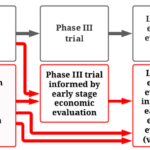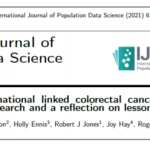The Cardiac CARE trial tested whether tablet medications called angiotensin receptor blockers and B-blockers, taken together (cardioprotection therapy), can prevent heart muscle injury related to chemotherapy. The health economics study question, as outlined in the Cardiac CARE protocol, is the following: “What are the important drivers of differences in costs and quality-adjusted life-years (QALYs) between …
Direct and indirect mapping of the BATH disease activity and function indices (BASDAI/BASFI) onto the EQ-5D-5L utility index in axial spondyloarthritis
What is the problem? Clinical studies designed to assess the effectiveness of health technologies would ideally include outcome measures that are directly linked to utility measures of health-related quality of life. Health utilities are preference values that patients attach to their overall health status. This data is required to calculate quality-adjusted life years (QALYs) for …
HESG Winter Poster Presentation: Use of social care services by patients diagnosed with colorectal cancer

The 99th Health Economics Study Group (HESG) meeting has just taken place (5-7th January 2022) at the University of Leeds. The HESG always makes for a great conference with excellent discussion and input into ongoing research. This is partly down to the unique set up of the meeting, whereby authors submit their work but they …
How can early stage economic evaluation help guide research for future vaccines?

In many countries, economic evaluation is conducted using decision analytic models and must be undertaken in order to assess value for money and to make funding decisions for vaccines and other pharmaceuticals . These analyses are routinely conducted only at a late stage once the vaccine development process is complete or near complete (e.g. after phase …
NCRI Festival: Early colorectal cancer treatment and outcomes in Scotland
Last month (8-12 November), the Scottish Bowel Cancer Intelligence UK team at Edinburgh Health Economics attended the National Cancer Research Institute (NCRI) Festival: Making cancer research better together, with a poster on their recent work “Early colorectal cancer treatment and outcomes in Scotland: real world evidence from national linked administrative data”. We thought we would …
Plain language summary: Creation of the first national linked colorectal cancer dataset in Scotland

In this post, we share a plain language summary of one of our recent papers – Creation of the first national linked colorectal cancer dataset in Scotland: prospects for future research and a reflection on lessons learned (Hanna & Lemmon et al, 2021) – that has been written by the Patient Public Group of Bowel …
Health economic studies of colorectal cancer and the contribution of administrative data

Several forces are contributing to an increase in the number of people living with and surviving colorectal cancer (CRC). However, due to the lack of available data, little is known about the implications of these forces. In recent years, the use of administrative data to inform research has been increasing. Administrative data is collected routinely ‘by …
Reflecting on two years of our undergraduate health economics module

For the past two years, Edinburgh Health Economics have offered an options module in Health Economics to undergraduate 3rd and 4th year economics students at Edinburgh (ECNM10082). The module, led by Dr Elizabeth Lemmon with Aileen Neilson as co-lecturer and Alistair Bullen as Tutor, aims to provide students with an introduction to the key concepts, …
Creation of the first national linked colorectal cancer dataset in Scotland

At the end of April, Peter and Elizabeth, along with lead author Dr Catherine Hanna and patient representative Mr Steve Clark, presented their recent publication at the Power of Population Data Science Webinar Series. Very briefly, the manuscript published in the International Journal of Population Data Science – Creation of the first national linked colorectal cancer …
Challenges of health economics in palliative care

Within the UK, a standard approach to compare the cost-effectiveness of interventions has been established by decision makers like NICE. It relies on the costs to the NHS and social care balanced against difference in QALYs. For several reasons, this approach falls short when evaluating interventions at the End of Life. Firstly, a significant proportion …
